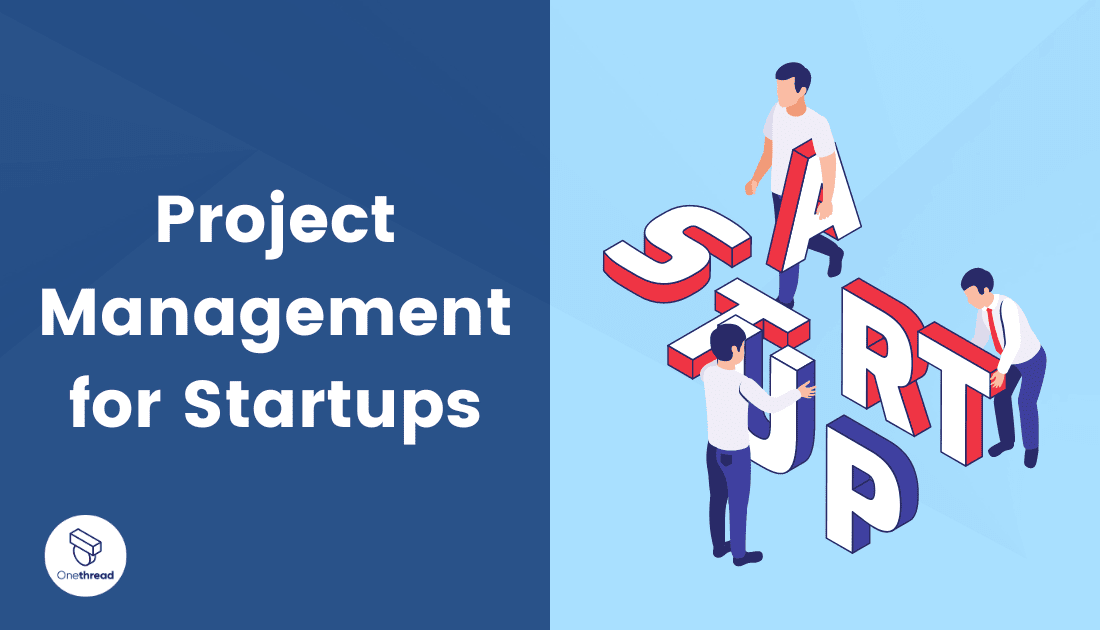In today’s competitive business landscape, a staggering 70% of startups fail within the first five years. A core contributor? Inadequate project management. While many entrepreneurs bring groundbreaking ideas to the table, the execution and management of these ideas often become the stumbling block.
A solid grasp of project management can be the differentiator, ensuring that a startup not only survives but thrives. This article delves deep into the essentials of project management for startups, offering actionable insights bolstered by hard data.
Let’s navigate this critical journey together, understanding how project management can be the lifeblood of startup success.
The Significance of Project Management for Startups
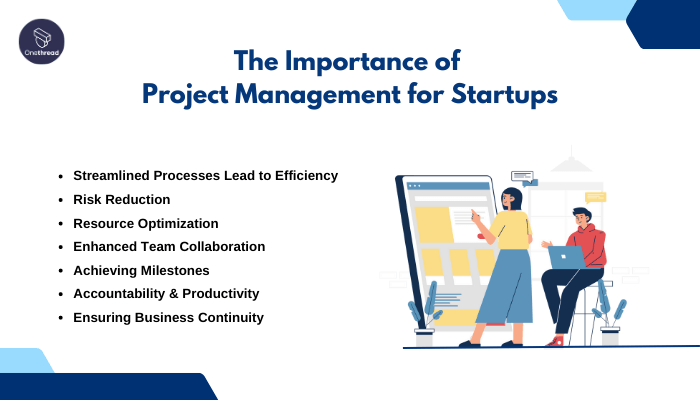
In the bustling world of startups, where every second counts and resources are often limited, the importance of effective project management cannot be overstated.
For many entrepreneurs, their vision and passion drive them, but turning these dreams into a sustainable reality requires more than just enthusiasm. Here’s where project management steps in.
1. Streamlined Processes Lead to Efficiency
According to the Harvard Business Review, a significant 75% of startups don’t see past their initial three years. One of the leading causes? Inefficient processes. Effective project management introduces structured methodologies that ensure tasks are completed on time and within budget.
2. Risk Reduction:
Proper project management allows for risk identification, assessment, and mitigation, ensuring that startups don’t expand their operations prematurely or without the necessary groundwork.
3. Resource Optimization:
For startups, resources, be it manpower or capital, are usually tight. Project management ensures that every penny and every minute are utilized to their utmost potential. A study from PricewaterhouseCoopers revealed that using advanced project management tools increases the success rate of projects by 40%.
4. Enhanced Team Collaboration:
Startups often have cross-functional teams. Designers, developers, marketers – everyone needs to be on the same page. Effective project management fosters better communication and teamwork, ensuring everyone knows their role and responsibilities.
5. Achieving Milestones:
Forbes stated that setting and achieving short-term milestones increases a startup’s chances of longer-term success. Project management not only helps set these milestones but also monitors the progress towards achieving them.
6. Accountability & Productivity:
Startups can’t afford Slack. Every team member’s role is crucial. Through project management, tasks are assigned, and accountability is established. This clarity boosts overall productivity. As per a survey by Atlassian, clear task management can elevate team productivity by up to 80%.
7. Ensuring Business Continuity:
With the dynamic nature of the startup ecosystem, being adaptable is key. A well-structured project management approach ensures that, amid changes, the core objectives are always in focus, ensuring the business keeps moving forward.
In conclusion, project management isn’t just a corporate buzzword; for startups, it can be the difference between flourishing and floundering. Embracing it wholeheartedly is the game-changer a startup needs to make its mark.
Expert Tips: Project Management in Startup & Entrepreneurs Environments
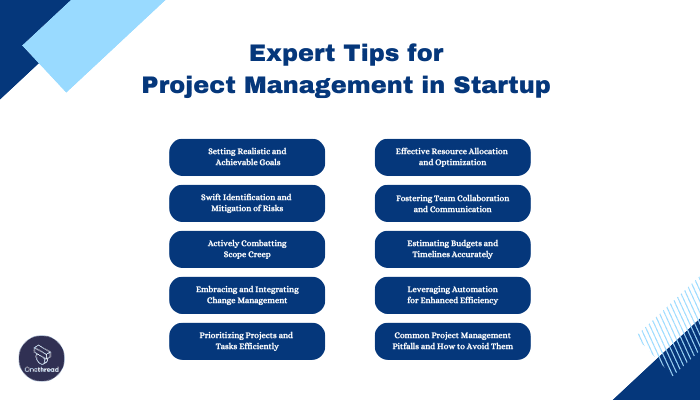



When you’re at the helm of a startup or embarking on an entrepreneurial journey, the stakes are high. Every decision can tip the balance between success and setback. Leveraging effective project management can be your secret weapon in navigating these tumultuous waters.
1. Setting Realistic and Achievable Goals
Start with the end in mind. A Harvard Business Review study found that 70% of startups fail due to premature scaling, which often stems from not having clear, realistic goals. Define what success looks like for your project, break it down into smaller milestones, and monitor progress regularly.
2. Swift Identification and Mitigation of Risks
In the dynamic startup ecosystem, risks are ever-present. A Forbes report reveals that 90% of startups fail, and a significant number attribute this to unforeseen challenges. Adopt a proactive approach. Identify potential hurdles early, develop contingency plans, and pivot when necessary.
3. Actively Combatting Scope Creep
Scope creep, or the expansion of a project outside of its original objectives, can derail startups. The Project Management Institute states that almost 50% of projects experience scope creep. Combat this by setting clear project boundaries and being vigilant about changes.
4. Embracing and Integrating Change Management
With the tech landscape evolving at lightning speed, change is the only constant for startups. According to McKinsey, 70% of change programs fail to achieve their goals. To be in the successful 30%, embed change management principles from the outset.
5. Prioritizing Projects and Tasks Efficiently
In the frenetic world of startups, everything feels urgent. Yet, a Gallup study showed that only 20% of workers feel they manage their time effectively. Prioritize tasks based on impact and urgency, and revisit this list frequently.
6. Effective Resource Allocation and Optimization
Lean startups often work with limited resources. Efficiently utilizing every asset, be it human or technological, can be the difference between growth and stagnation. Continuous training and process refinement can help optimize resource allocation.
7. Fostering Team Collaboration and Communication
Startups thrive on teamwork. Tools like Onethread can facilitate seamless communication, ensuring everyone is on the same page. After all, an MIT Sloan study found that companies that communicate effectively are 20% more likely to retain employees.
8. Estimating Budgets and Timelines Accurately
Underestimating costs or timelines can strain startups. CBInsights found that 29% of startups fail due to cash-flow problems. Ensure you have a cushion in your estimates and monitor budgets regularly.
9. Leveraging Automation for Enhanced Efficiency
Automation tools, such as Onethread, can streamline workflows. A McKinsey report indicates that 60% of occupations could benefit from 30% automation of tasks, freeing up time for strategic initiatives.
10. Common Project Management Pitfalls and How to Avoid Them
Learn from the past. Analyzing the failures and successes of similar startups can provide valuable insights, preventing repeat mistakes and capitalizing on proven strategies.
Effective project management isn’t just about tools or methodologies; it’s a mindset. For startups and entrepreneurs, where every minute counts, weaving these expert tips into the fabric of their operations can pave the path to sustained success.
Choosing the Right Project Management Methodes for Startups
Choosing an effective project management methodology is akin to selecting the perfect engine for a vehicle. Just as a race car and a freight truck require different engines to function optimally, startups, with their unique challenges and dynamics, need tailored project management methodologies to drive success.
Scrum for Startups:
Scrum is an agile framework designed for projects with rapidly changing or highly emergent requirements. According to the State of Agile Report, 58% of organizations have adopted Scrum as their primary Agile methodology. Why?
Scrum encourages quick iterations, regular feedback, and adaptability. For startups, this means efficiently responding to market changes and continuously refining products or services based on real-time feedback.
Kanban in Startup Settings
Kanban, originating from Japanese manufacturing systems, is all about visual management. A Lean Construction Journal report highlighted that projects implementing Kanban experienced a 200% improvement in delivery times. Startups can benefit from Kanban’s visual boards to prioritize tasks, streamline workflows, and minimize cycle time, ensuring products or features are rolled out faster.
Waterfall Approach in Startups
Traditionally used in software development, the Waterfall approach follows a linear and sequential design where each phase depends on the deliverables of the previous one.
While the CHAOS Report states that Agile projects are 28% more successful than traditional projects, Waterfall could be suitable for startups with clear requirements and minimal changes expected throughout the project.
Critical Path Method (CPM) for Early-stage Companies
CPM focuses on the essential tasks that must be completed to reach the project’s end date. According to the Project Management Institute, integrating CPM can reduce timelines by 10-30%. Startups, especially those on tight schedules, can leverage CPM to identify the most critical tasks and allocate resources efficiently, ensuring timely product launches.
There’s no one-size-fits-all when it comes to project management methodologies for startups. It’s crucial for founders to assess their unique requirements, understand the strengths and weaknesses of each methodology, and make an informed decision that will propel their startup toward success.
Deciding Factors for Projcet Management Startups
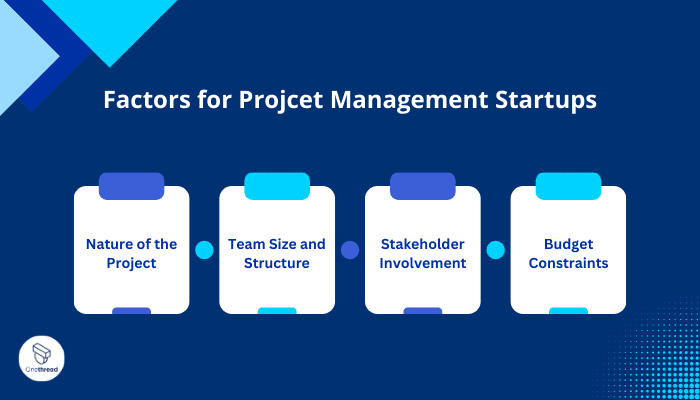



Nature of the Project:
A startup working on a technology product might find Agile methodologies like Scrum or Kanban more beneficial due to the iterative nature of tech development. In contrast, a startup focusing on manufacturing might prefer Waterfall or CPM.
Team Size and Structure:
Small teams might find Scrum meetings and short sprints more manageable. In contrast, larger teams might benefit from the structure and predictability of the Waterfall approach.
Stakeholder Involvement:
If regular feedback and adjustments based on stakeholder input are essential, Agile methodologies like Scrum would be more appropriate.
Budget Constraints:
For startups operating on a shoestring budget, Kanban, with its focus on continuous delivery and reduced cycle times, might be more effective in ensuring a quicker ROI.
Reviewing Top Project Management Tools for Startups
Navigating the startup landscape requires agility, adaptability, and a solid project management foundation. Luckily, there are myriad tools available to help startups stay on course. Here’s a review of some of the top project management tools tailored for startups, focusing on their unique selling points and their fit in a startup environment.
1. Onethread
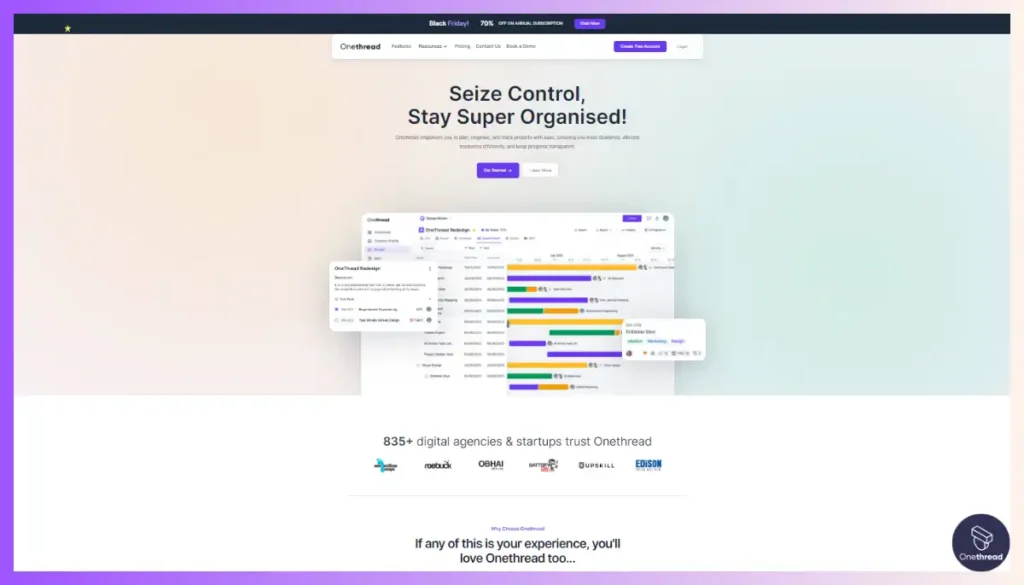

A holistic solution, Onethread integrates several project management facets into a single platform, making it a one-stop-shop for startups. Why it’s Suitable for Startups: Its intuitive design ensures a minimal learning curve, allowing startups to hit the ground running.
Startups operate in a unique ecosystem where agility, collaboration, and efficient resource management are paramount. Onethread emerges as the perfect project management tool to empower startups with its tailored features designed to catalyze growth, foster innovation, and drive success. Here’s why Onethread stands out as the right choice for startups:
Agile Task Management:
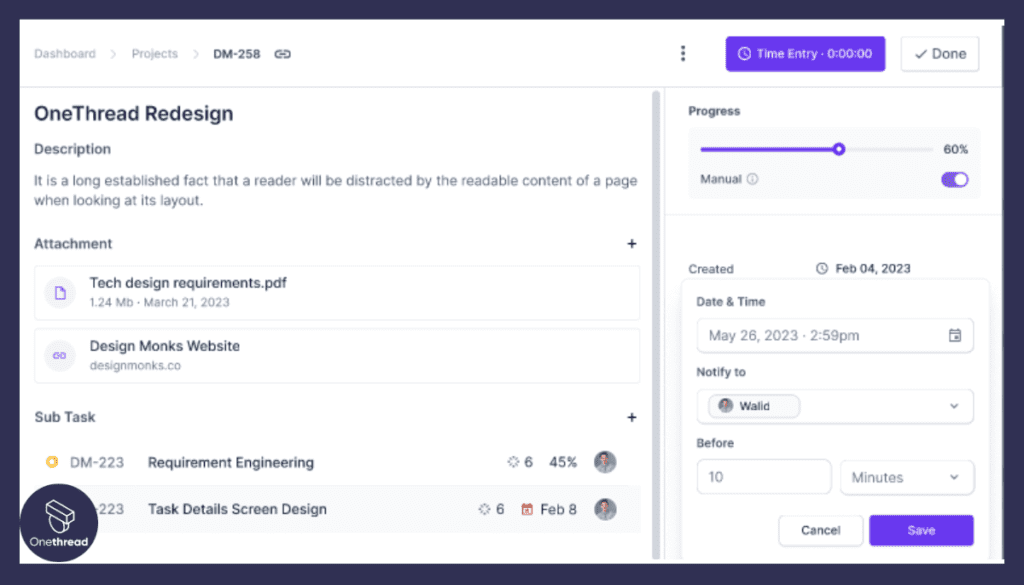



Startups thrive on adaptability. Onethread’s agile task management feature aligns perfectly with the fast-paced nature of startups. Prioritize tasks, assign responsibilities, and adjust project plans on-the-fly. This flexibility ensures that startups can pivot quickly and respond to evolving market dynamics with ease.
Transparent Communication:
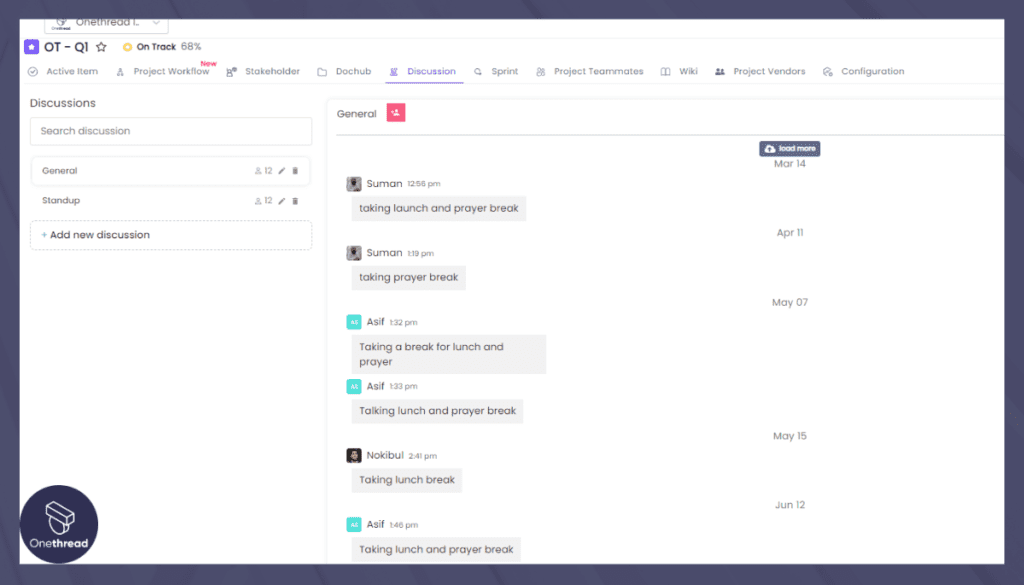



Communication is the backbone of startup success. Onethread’s real-time messaging and discussion features create a transparent communication channel, enabling seamless exchanges of ideas and updates among team members. This transparency nurtures a collaborative environment where everyone is informed, engaged, and aligned.
Cost-Effective Scalability:
Startups often need to achieve more with fewer resources. Onethread’s cost-effective pricing and scalability make it an ideal solution. As your startup grows, Onethread grows with you, accommodating additional team members and projects without straining your budget.
Resource Optimization:
Managing resources efficiently is crucial for startups. Onethread’s task and workload management features ensure that resources are allocated judiciously. Startups can maximize productivity, prevent burnout, and ensure that each team member contributes optimally to the company’s growth.
Data-Driven Decision-Making:




Data insights drive smart decisions. Onethread’s data visualization tools offer startups a clear view of project progress, timelines, and performance metrics. Informed decisions based on real-time data empower startups to fine-tune strategies and stay on a path of continuous improvement.
Collaborative Innovation:
Startups thrive on innovation, and Onethread fuels this spirit. Its collaborative environment allows team members to brainstorm, share ideas, and contribute insights asynchronously. This inclusive atmosphere fosters creative problem-solving and drives innovation from diverse perspectives.
In the fast-paced world of startups, Onethread emerges as a guiding light, offering agile task management, transparent communication, cost-effective scalability, resource optimization, data-driven decision-making, and collaborative innovation. Whether you’re a lean team with ambitious goals or a rapidly growing startup navigating uncharted waters, Onethread is the project management tool that empowers startups to navigate challenges, seize opportunities, and pave the way for lasting success.
2. ProofHub
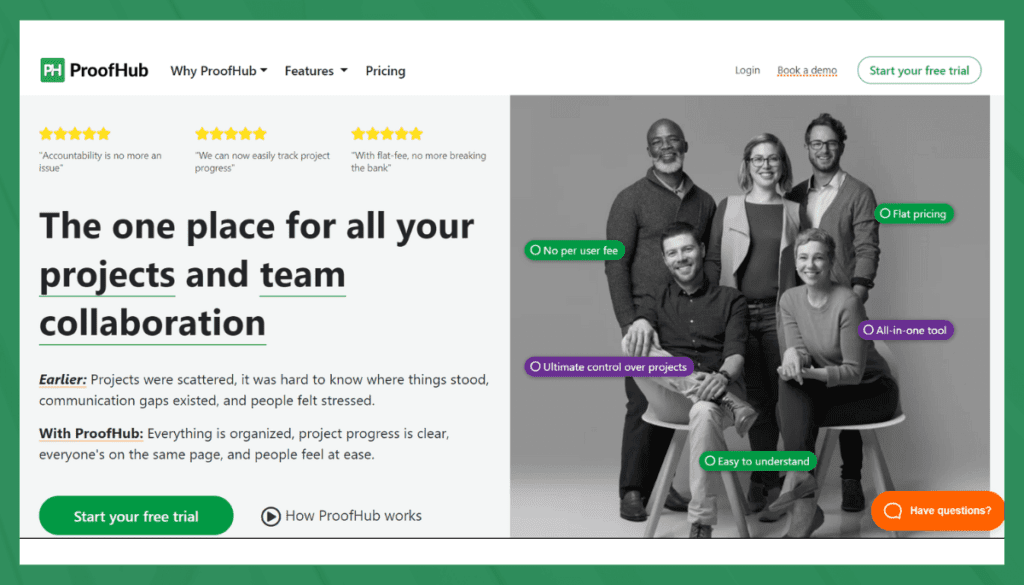



Unique Selling Point: ProofHub stands out with its visual proofing feature, enabling teams to review and collaborate on designs seamlessly. Why it’s Suitable for Startups: For startups in the design or creative domain, ProofHub provides a central place for feedback, reducing miscommunications and ensuring faster project delivery.
3. nTask
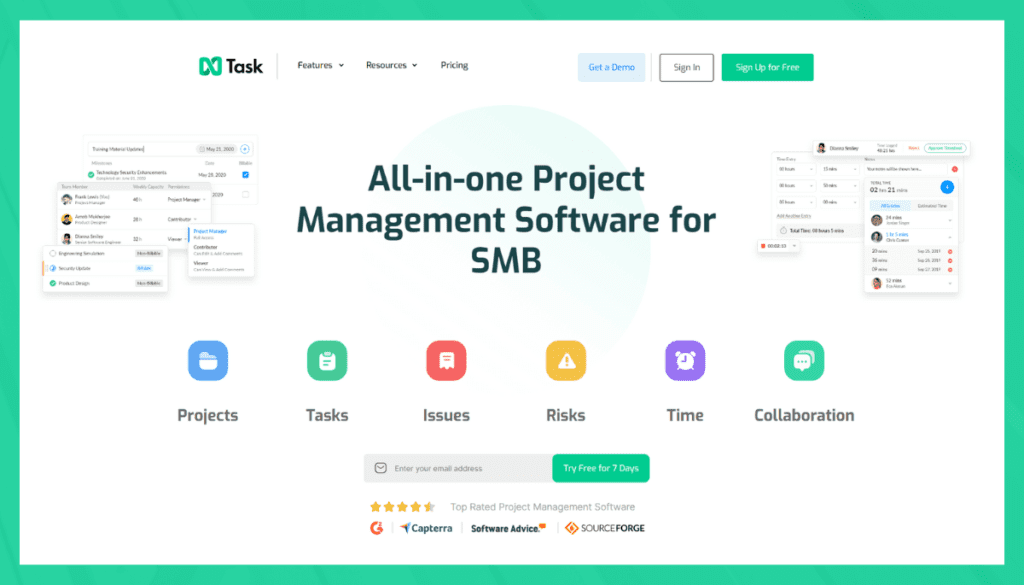



Known for its comprehensive risk management features, nTask enables startups to identify, assess, and prioritize risks effectively. Why it’s Suitable for Startups: With limited resources, startups can’t afford to ignore potential pitfalls. nTask ensures they are prepared for every eventuality, making it an essential tool for early-stage companies.
4. Droptask (Ayoa)
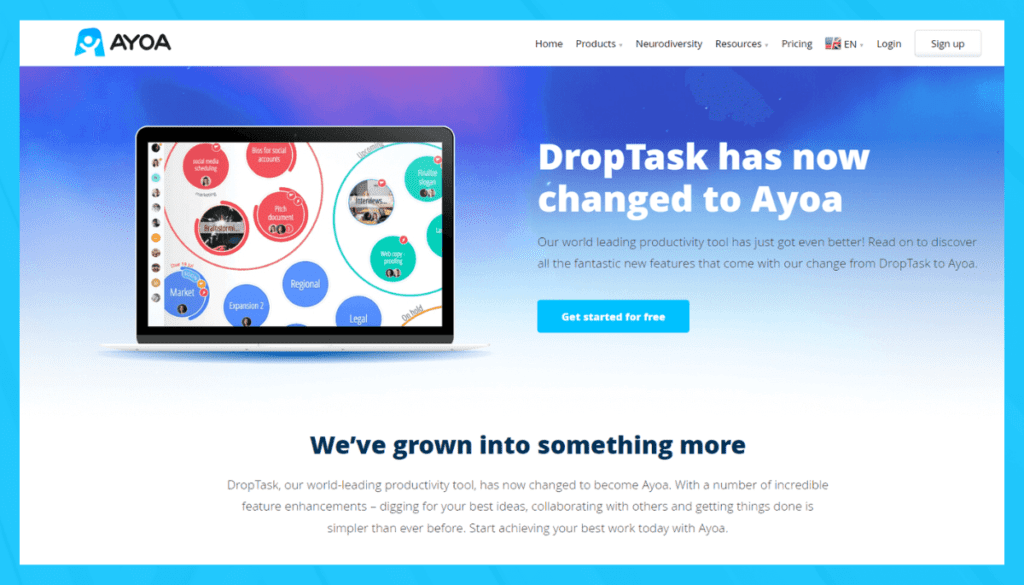



Unique Selling Point: Droptask, now known as Ayoa, offers a visually rich interface, turning task management into a highly visual and engaging process.
Why it’s Suitable for Startups: The brain processes visuals faster than text. For fast-paced startups, Droptask’s visual boards can simplify complex tasks, ensuring teams stay aligned and projects remain on track.
5. Hitask




Unique Selling Point: Hitask eliminates the need for lengthy email threads by providing a unified platform for task management, team collaboration, and communication.
Why it’s Suitable for Startups: Communication is key in the startup world. Hitask ensures that no crucial detail gets lost in the shuffle, promoting transparency and collaboration.
Summary Table:
Tool | Unique Selling Point | Suitability for Startups |
  | Holistic integration of project management features | Minimal learning curve; automation for efficiency |
  | Visual proofing for collaborative design review | Centralized feedback mechanism; tailored for creative startups |
  | Comprehensive risk management | Ensures preparedness against potential risks |
  | Visual task management | Simplifies complex tasks with visual boards |
  | Unified platform for task management and communication | Reduces communication clutter, promotes team alignment and transparency |
Conclusion
For startups, navigating the tumultuous waters of the business world requires more than just a great idea; it demands robust project management. Embracing effective project management methodologies ensures streamlined processes, optimized resources, and a pathway to success.As startups evolve, so must their approach to handling projects. Investing in the right project management tools, like Onethread or ProofHub, can significantly boost efficiency and collaboration. Ultimately, understanding and implementing solid project management strategies is not just an option—it’s a prerequisite for startups aiming for long-term success and sustainability in an ever-competitive marketplace.
